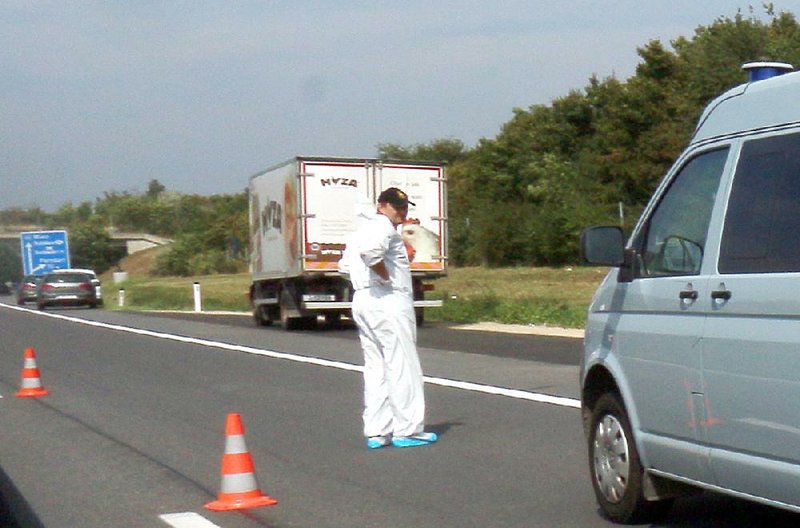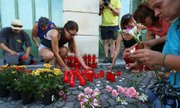PARNDORF, Austria -- Austrian police on Thursday discovered the decomposing bodies of at least 20 -- and possibly up to 50 -- migrants stacked in a truck parked on the shoulder of the main highway from Budapest to Vienna.
The find came as Austria hosted a conference in Vienna on European Union relations with western Balkan nations, which have been overwhelmed this year by the tens of thousands of refugees and other migrants trying to cross Europe.
Police ordered reporters at the scene 25 miles southeast of Vienna to move away from the vehicle, a white refrigeration truck with pictures of chickens on it. The truck, with all the bodies still inside, was later taken away to a secure location so forensic experts could examine it more thoroughly.
The state of the bodies on a hot summer day made establishing the identities and even the exact number of dead difficult, and police opted to start that work once the truck was towed from the highway.
Asked how many bodies were in the vehicles, Hans Peter Doskozil, chief of Burgenland provincial police, said "20, 30, 40 -- maybe up to 50."
Doskozil told reporters in Eisenstadt, the provincial capital, that information provided by Hungarian police indicates that the truck was somewhere east of Budapest early Wednesday, and drove into Austria later in the day before being abandoned. Some of the bodies are badly decomposed, the others less so, but their state indicates that the people may have died before the vehicle entered Austria, he said.
The truck was taken to a hall near the border where "cooling possibilities" were available, and police would open the vehicle once temperatures were low enough to begin that work, said Doskozil. Removing the bodies and work on trying to identify them would likely last all night before the bodies were taken to Vienna for autopsies, he said.
Police spokesman Helmut Marban said police stopped shortly before noon Thursday thinking that the parked truck had some mechanical trouble. Then they "saw blood dripping" from the vehicle and "noticed the smell of dead bodies," he said.
The truck had Hungarian license plates but the writing on its side and back was in Slovak.
Police declined to give further information on the victims' possible identities, whether children were among them, how the people might have died or other details, and state prosecutor Johann Fuchs said "we cannot speculate how long it will take to determine what the refugees died of" until the autopsies are done.
At Thursday's EU-Balkan conference, participants held a moment of silence and condemned the traffickers.
"Human smugglers are criminals," said Austrian Foreign Minister Johanna Mikl-Leitner. "Those who still think that they are gentle helpers of refugees are beyond saving."
Austrian Chancellor Werner Faymann said the deadly tragedy showed how critical it was for nations to work together on solutions to the influx of refugees and other migrants.
"Today refugees lost the lives they had tried to save by escaping, but lost them in the hand of traffickers," he told reporters.
German Chancellor Angela Merkel, who also was at the conference, said she was "shaken by the awful news."
"This is a warning for us to tackle the issue of migration quickly," Merkel said. "We have more refugees in the world than at any time since World War II. The world's eyes are upon us."
The truck apparently used to belong to the Slovak chicken meat company Hyza, part of the Agrofert Holding, which is owned by Czech Finance Minister Andrej Babis.
Agrofert Holding, in a statement, said the company had sold the truck in 2014. The new owners did not remove the truck's logos as required and Hyza had nothing to do with the truck now, the company said.
The Hungarian government said the truck's license number plates were registered by a Romanian in the central city of Kecskemet.
At the Vienna conference, Merkel and German Foreign Minister Frank-Walter Steinmeier renewed their call to share the burden of aiding refugees throughout the EU's 28 member states after the rejection of binding quotas by some European nations. The two also pushed to set up registration centers for asylum-seekers in countries such as Greece and Italy.
"Don't doubt our determination," Merkel said of reaching an accord on quotas. "What we see on a daily basis requires us to act."
Earlier at the conference, Serbia, which isn't part of the EU, criticized the bloc for failing to stem the wave of refugees flowing through the Balkans, saying the region is paying for the bloc's inability to handle the crisis.
"It's a European Union problem, but we're expected to come up with an action plan," Serbian Foreign Minister Ivica Dacic told conference attendees. "I have to be very direct here, please understand. We bear the brunt of the burden."
Meanwhile on Thursday, Hungary deployed police reinforcements to rein in an unrelenting flow of migrants across its porous border.
Police reported Wednesday a single-day record of 3,241 detentions of migrants, 700 more than the previous day, as they started a new plan seeking to channel migrants to one of the country's five camps using special trains.
The Hungarian government also is finishing quickly a razor-wire border fence to keep migrants from crossing in from Serbia.
Police rounding up migrants put them first on buses, then on the trains in Hungary's principal border city, Szeged with instructions to report voluntarily to one of the country's five Immigration Office-run camps
Information for this article was contributed by Ronald Zak, George Jahn, David Rising, Pablo Gorondi, Karel Janicek, Shawn Pogatchnik, Bela Szandelszky, Jovana Gec and Amer Cohadzic of The Associated Press and by Arne Delfs, Boris Groendahl and Patrick Donahue of Bloomberg News.
A Section on 08/28/2015



